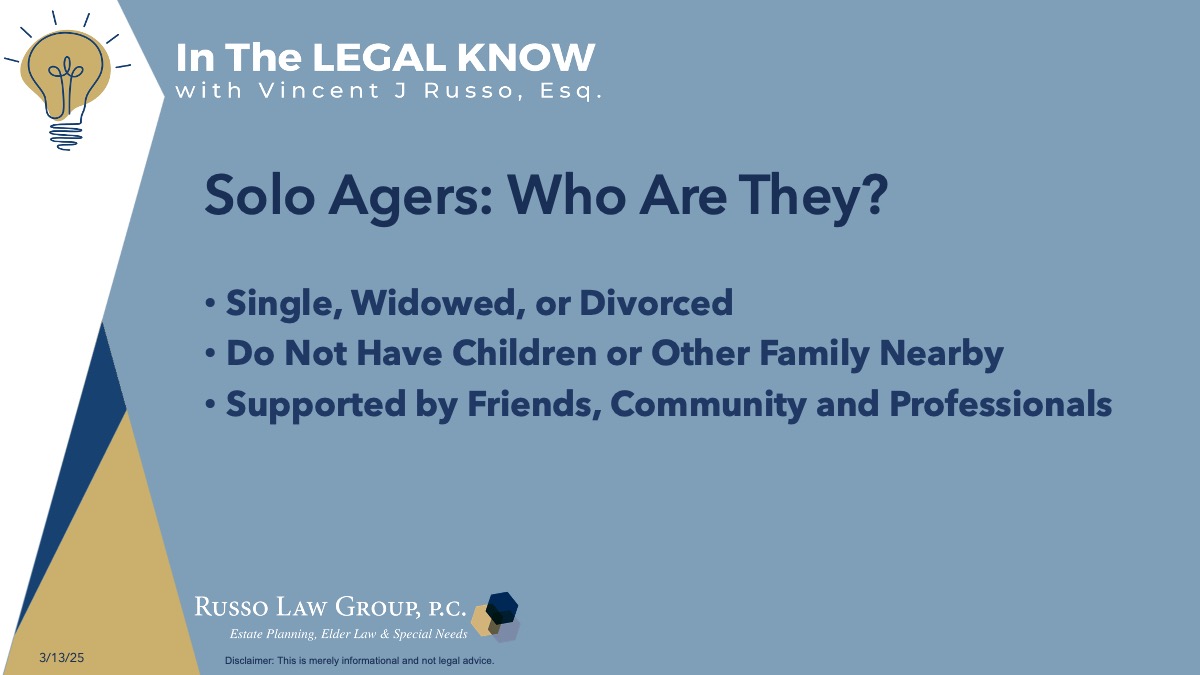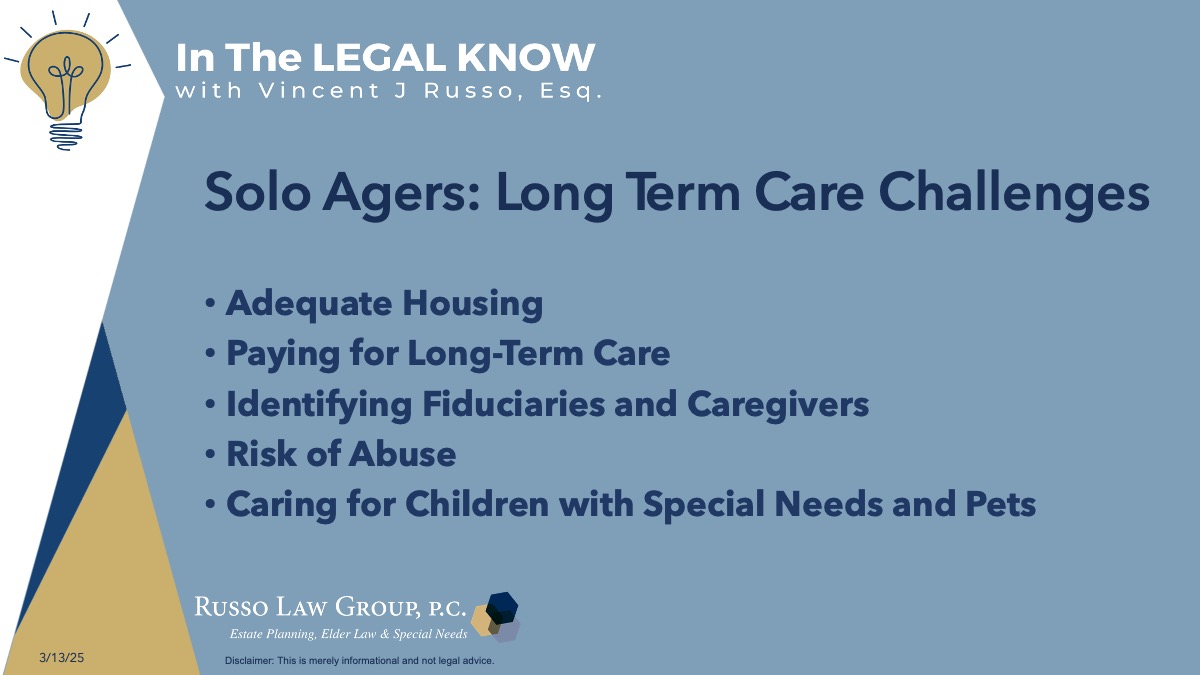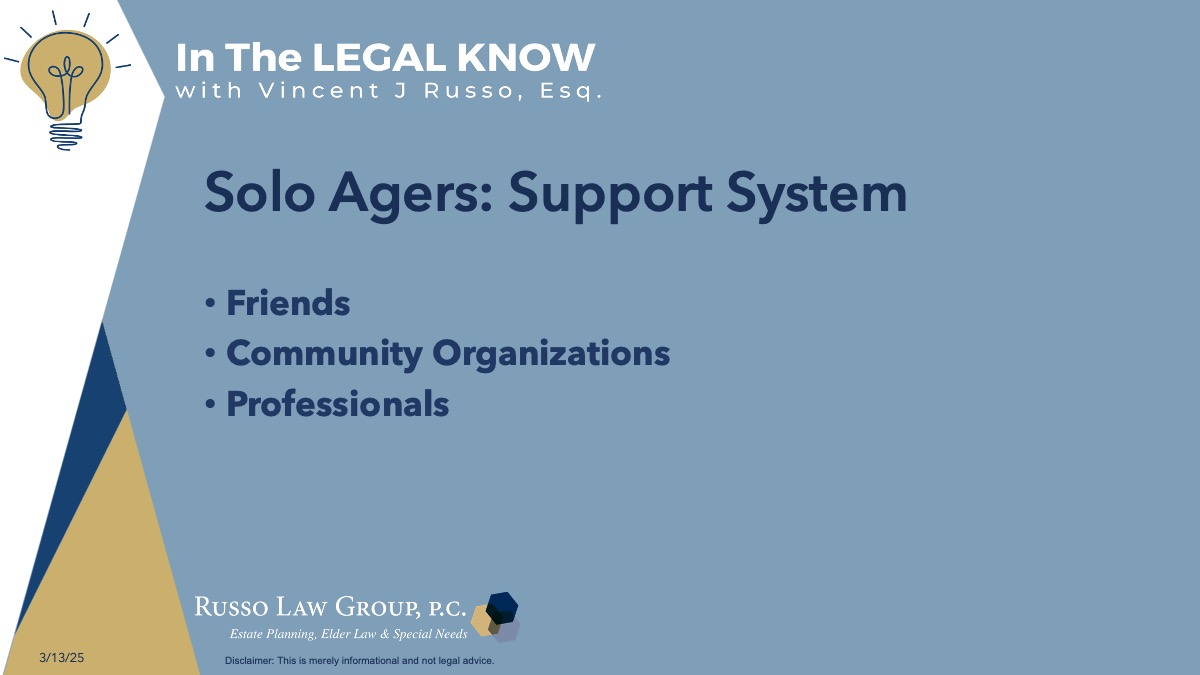Watch “In The Legal Know” with Vincent J. Russo Vincent appeared on CFN Live on…
This originally aired on the Catholic Faith Network’s show CFN Live: https://youtu.be/dc8XFfQBgK8
By choice or by circumstance, there is a new breed of older people in this country. They are referred to “solo agers” and there are approximately 13 million older adults in the United States.
What does it mean to be a solo ager?
A “solo ager” refers to an older adult who is aging without the immediate support of a spouse, partner, or close family members.

This term typically applies to individuals who are single, widowed, or divorced and do not have children or other family nearby to assist with their care and support as they age. Solo agers often need to rely on friends, community resources, or professional services to meet their social, healthcare, and daily living needs.
Different culture view autonomy differently as adults get older. In China, they are referred to as the “three no older adults” – those with no children, no ability to work and no income.
 The number of solo agers is expected to grow as the population ages and more individuals choose to live independently. Factors contributing to this trend include increased life expectancy, changing family structures, and personal preferences for independence.
The number of solo agers is expected to grow as the population ages and more individuals choose to live independently. Factors contributing to this trend include increased life expectancy, changing family structures, and personal preferences for independence.
While many older Americans, who are 65 and older, experience a range of challenges as they age, solo agers who lack the historically traditional support system of a spouse and/or adult children may face even greater challenges.
What health care challenges do solo agers face?
Solo agers face many challenges such as navigating complex healthcare systems and understanding insurance coverage. Sometimes, scheduling appointments can be difficult due to limited availability of specialists. Additionally, transportation to medical facilities can be a concern, especially if I am not feeling well.
Helpful Tips: Solo agers should maintain regular check-ups and stay informed about their health conditions. They should consider utilizing tele-health services for consultations, which allows one to access medical advice conveniently. Additionally, keeping a detailed health record and medication list to share with my healthcare providers is advisable
What about Long Term Care challenges for solo agers?
There are several essential challenges in establishing and implementing a long-term care plan that exist for solo agers as well as those individuals in a historically traditional family. The biggest difference in long-term care planning for solo agers is that some of their concerns are more heightened, the planning options may be more limited, and there may not be a backup plan.

When considering long-term care planning for solo agers some common issues that must be addressed include, but are not limited to, identifying adequate housing, paying for the cost of long-term care, identifying fiduciaries, identifying caregivers, risk of abuse, providing continued care for children with special needs and pets, coordinating, and attending meetings with financial and health care professionals.
What about Lifetime Planning for solo agers?
The most basic and fundamental elements to estate and long-term care planning for older Americans to consider are lifetime planning and legacy planning.
To plan for one’s lifetime, the first step is to take care of day to day living. A combination of organization and technology can be employed to manage daily tasks. For example, using calendars and reminders on one’s phone to keep track of appointments and responsibilities or breaking larger tasks into smaller, manageable steps to avoid feeling overwhelmed. By staying on task, the solo ager can enhance their life experiences while alleviating stress and worry.
Solo agers also need to determine who will make decisions on their behalf if they become incapacitated or need assistance.
The options available to make routine or major decisions related to finances, healthcare, and housing for adults who lack the requisite legal capacity to make these decisions themselves generally require another person or entity to step into the shoes of the person who lacks capacity. In these situations, solo agers must plan accordingly or risk having their autonomy determined by circumstance or a court.
An experienced elder law attorney can provide recommendations about what legal documents are necessary to allow trusted relatives, friends, or professionals to make these kinds of decisions.
How do solo agers view Legacy Planning?
Legacy planning, which is commonly known as estate planning, requires thinking about what is important to us and how we want to be remembered.
The foundation for any estate plan is a Last Will and Testament (Will) but a better approach for solo agers is to establish a revocable living trust and fund the trust with their assets. The solo agers can be the trustee of the trust during their lifetimes and all the assets can be used for the benefit of the solo ager. Upon the solo ager’s death, the successor trustee(s) can collect and administer the assets of the trust according to the solo ager’s wishes that are spelled out in the trust without any court intervention without court involvement.
Solo agers can also establish beneficiary designations on all their financial accounts, retirement accounts, and insurance policies, which will allow the balance of the accounts to pass automatically to the beneficiary.
The solo ager needs to understand the consequences of passing away without a Will. It will be critical for the solo ager to create a family tree to better understand the intestacy laws that apply to the solo ager. Further, the family tree will be helpful and may even be required in the solo ager’s estate or trust administration.
What support systems would be helpful to solo agers?
Support systems will be essential for the well-being of a solo ager.
The solo ager can benefit from a diverse support system that includes (i) having close friends who I can rely on for emotional support and companionship, (ii) involvement in community groups that focus on activities the solo ager enjoys (such as book clubs and volunteer organizations), (iii) utilize professional services, such as counseling and health care providers, to ensure that I have access to the resources These connections can provide a strong foundation that helps me navigate the challenges of solo aging.
To maintain social connections and combat feelings of isolation, it is helpful to have regular communication with friends and family, whether through phone calls, video chats, or in-person meetups, active participation in local community events and classes, which not only allow the solo ager to meet new people but also keep the solo ager engaged in enjoyable activities The solo ager may want to explore new hobbies and interests, which often leads to forming new friendships. By staying proactive in my social life and seeking out opportunities for connection, the solo ager can effectively mitigate feelings of loneliness.
Again, community resources and services can be helpful as well, such as local community centers and senior services. They offer programs such as meal delivery, transportation services, and social activities that help me stay connected and maintain my independence.
Any misconceptions about solo agers?
One common misconception is that solo agers are lonely or unhappy. While some may face challenges, many solo agers lead fulfilling lives, embracing independence and self-sufficiency. It’s also important to recognize that solo aging does not equate to being socially isolated; many solo agers cultivate rich social lives and community ties.
We hope you found this article helpful. Contact our office today at 1 (800) 680-1717 and schedule an appointment to discuss what makes sense for you and your loved ones.
Disclaimer: The information provided above is for general informational purposes only and is not legal advice.





Comments (0)